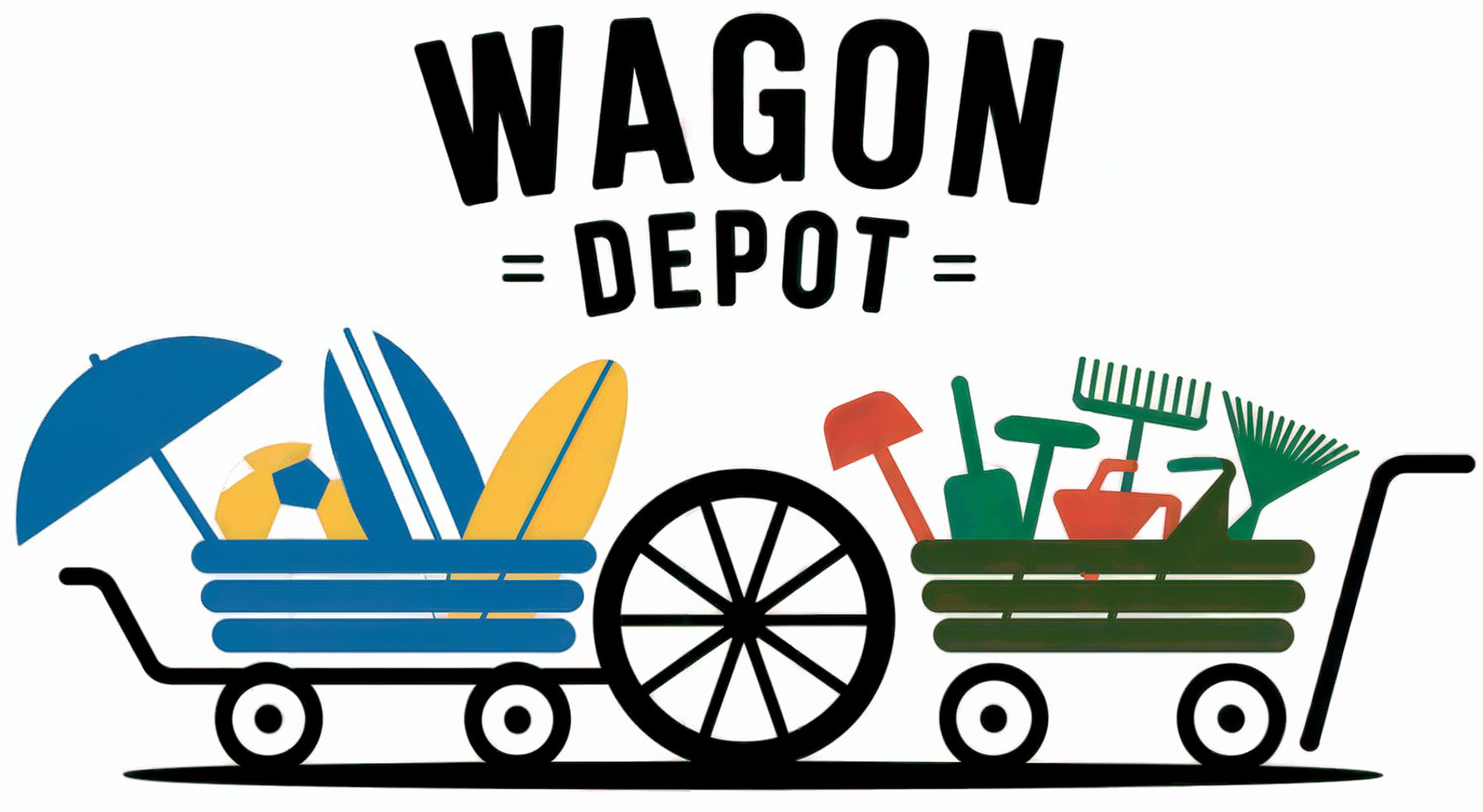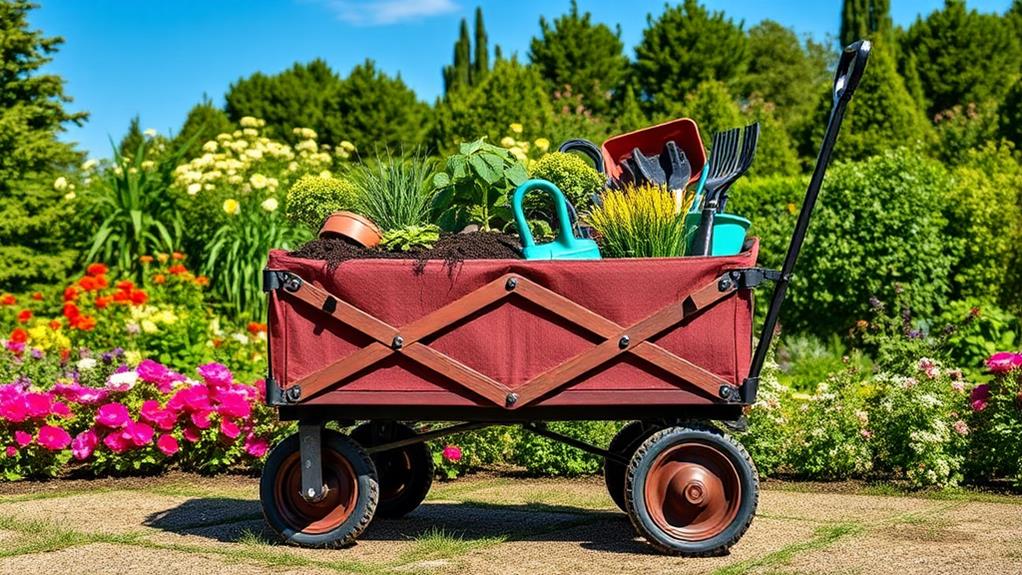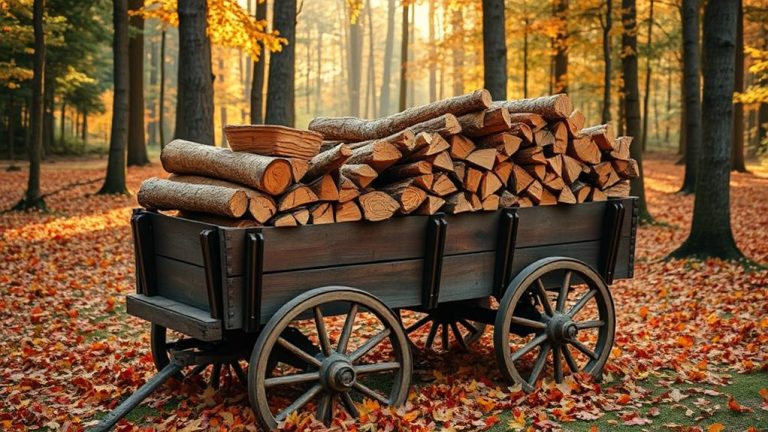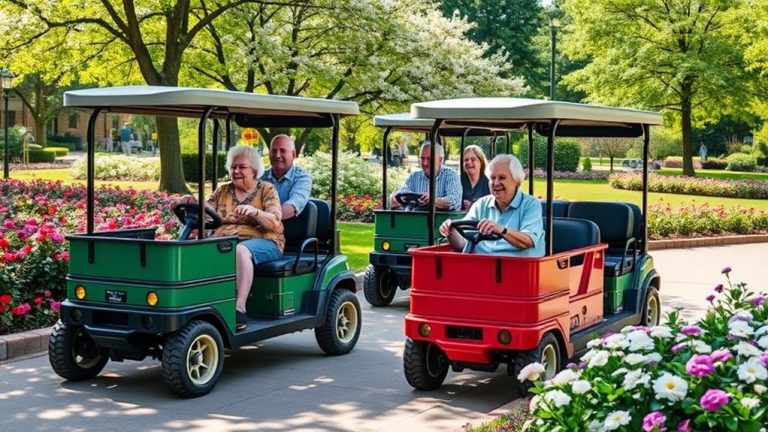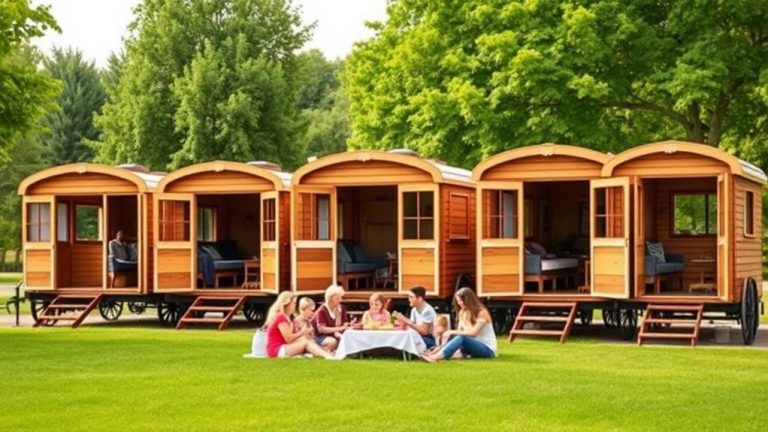When you're serious about landscaping, choosing the right heavy-duty garden wagon is essential. Look for options with at least a 1,200-pound load capacity, sturdy steel frames, and all-terrain wheels for maximum maneuverability. Popular models include the Gorilla Carts GOR4PS for its patented dump feature and the Creative Outdoor Distributor's wagon for its versatility. Ergonomic handles and foldable designs improve usability and storage. Pay attention to maintenance needs, too, as regular upkeep extends the lifespan of your wagon. Explore these selections to find the model that suits your landscaping tasks perfectly. More insights await you on the best features and options.
Features to Consider
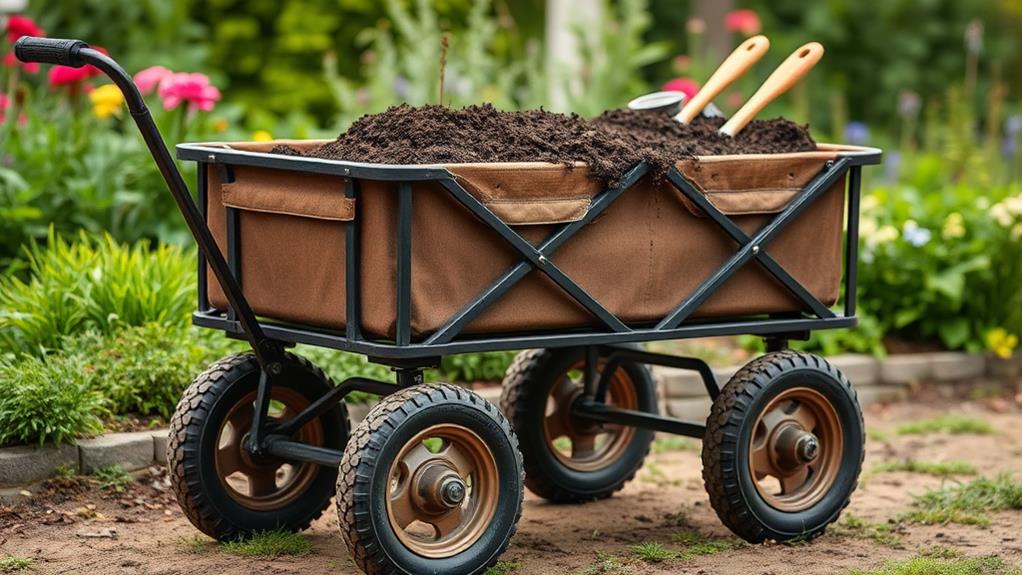
When selecting a heavy-duty garden wagon, consider various features that can enhance functionality and durability. One key aspect is the wheel types. Look for larger, all-terrain wheels that can handle uneven surfaces and provide better maneuverability. Pneumatic wheels are ideal for absorbing shocks, whereas solid rubber wheels are puncture-resistant and require less maintenance.
Next, pay attention to the load capacity of the wagon. A higher load capacity means you can carry heavier loads without straining the wagon's structure. For serious horticulturists, a capacity of at least 1,200 pounds is recommended. This guarantees you can transport soil, plants, and tools without worry.
Moreover, check the materials used in construction. Steel frames offer robust support, whereas plastic bodies can be lightweight and rust-resistant. A foldable design can additionally offer convenience for storage and transport.
Lastly, consider any extra features like sidewalls, which can help secure loads, and ergonomic handles for easy towing. By focusing on these features, you'll choose a heavy-duty garden wagon that meets your gardening needs and delivers the freedom to work efficiently.
Top Picks Overview
Now that you know the key features to evaluate, it's time to explore our top picks for heavy-duty garden wagons. We'll highlight recommended models that combine durability, functionality, and user-friendly design. This overview will help you make an informed choice for your gardening needs.
Key Features to Consider
Choosing the right heavy-duty garden wagon can make all the difference in your gardening and landscaping tasks. When selecting a wagon, consider the wheel types, as they greatly affect maneuverability and stability. Larger wheels are ideal for rough terrains, whereas smaller wheels may perform better on smooth surfaces. Pneumatic wheels offer excellent shock absorption, whereas solid wheels are puncture-proof and require less maintenance.
Next, pay attention to the weight capacity of the wagon. Confirm it can handle the load you plan to carry, whether it's soil, plants, tools, or debris. A wagon with a higher weight capacity guarantees you won't overstrain the wagon, leading to potential damage or safety hazards.
Moreover, look for features like a durable frame material and a rust-resistant finish, which improve longevity. Ease of use is equally critical—check for ergonomic handles and folding designs that promote storage and transport.
Recommended Models Overview
With the key features in mind, you're ready to explore some of the best heavy-duty garden wagons available on the market. Regarding garden wagon types, there are several standout models that cater to serious landscapers.
First, consider the Gorilla Carts GOR4PS. It boasts a robust steel frame and a 1,200-pound capacity, making it ideal for heavy loads. Its patented dump feature allows for easy unloading, which is a game-changer for efficiency.
Next, the Radio Flyer 2-in-1 is versatile, offering a flatbed mode for hauling larger items or a traditional wagon setup. Although it has a lower capacity at 150 pounds, it shines in maneuverability and ease of use.
For maximum capacity, the Creative Outdoor Distributor's Heavy-Duty Wagon can handle 1,000 pounds, perfect for hauling dirt, tools, and supplies. Its all-terrain wheels guarantee you can traverse various environments.
When selecting your garden wagon, keep capacity considerations in mind to guarantee you choose a model that meets your needs, allowing you to work efficiently and effectively in your landscaping endeavors.
Detailed Reviews
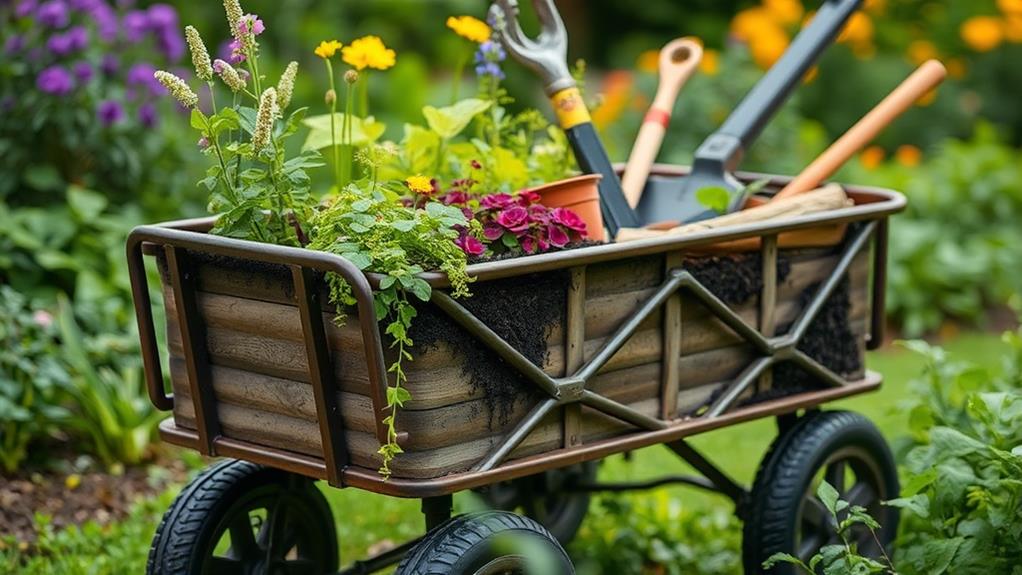
When selecting a heavy-duty garden wagon, it's essential to understand the top features that improve functionality and ease of use. You'll likewise want to take into account performance and durability ratings to guarantee your investment withstands the test of time. Let's break down these aspects to help you make an informed choice.
Top Features to Consider
A variety of significant features can greatly improve your experience with a heavy-duty garden wagon. First, consider the ergonomic design. A well-designed handle can reduce strain during transport, allowing you to navigate your yard or garden with ease. Look for adjustable handles and cushioned grips that promote comfort, especially during long hauling tasks.
Next, evaluate the weight capacity. A wagon's ability to handle heavy loads is fundamental for serious gardeners. Most heavy-duty models boast weight capacities ranging from 600 to 1,200 pounds. Verify the wagon you choose can accommodate the materials you'll be transporting, whether it's soil, plants, or tools.
Additionally, wheel quality is crucial. Large, durable wheels with a tread pattern suited for various terrains will improve maneuverability and stability. Opt for models with pneumatic tires for better shock absorption, especially on uneven ground.
Lastly, consider the wagon's build material. Steel frames offer durability, while lightweight aluminum can provide ease of transport without compromising strength. These features collectively confirm your heavy-duty garden wagon meets your gardening needs, improving both efficiency and comfort during your projects.
Performance and Durability Ratings
To guarantee you choose a heavy-duty garden wagon that meets your expectations, it's vital to assess performance and durability ratings based on user reviews and expert tests. Start by examining performance metrics, such as load capacity, maneuverability, and ease of assembly. A high load capacity indicates the wagon can handle heavy, bulky items, which is fundamental for serious landscapers like you.
Next, look into durability tests. These tests evaluate materials and construction quality, ensuring the wagon can withstand harsh outdoor conditions. Steel frames typically offer superior strength compared to plastic alternatives, whereas rust-resistant coatings can greatly extend the wagon's lifespan.
User reviews can provide insight into real-world performance. Pay attention to comments regarding the wagon's stability, wheel durability, and overall ease of use. If multiple users report issues with a specific model, it's a red flag.
Lastly, consider warranties and manufacturer support. A solid warranty often reflects a manufacturer's confidence in their product's durability. By carefully weighing these performance and durability ratings, you'll find a garden wagon that meets your demands and improves your landscaping experience.
Comparison Chart
This comparison chart provides a detailed overview of the top heavy-duty garden wagons currently available on the market. You'll find vital specifications and features that cater to serious landscapers who prioritize efficiency and reliability in their tools.
When evaluating material strength, look for wagons constructed from durable steel or high-grade plastic, as these materials considerably improve load capacity and longevity. Pay attention to the payload capacity, which varies by model and determines how much weight you can carry without compromising structural integrity.
Wheel types play an important role in maneuverability. Some models feature pneumatic tires that offer superior traction and shock absorption, making them ideal for rough terrain. Alternatively, solid rubber wheels provide durability and require less maintenance, though they may not perform as well on uneven surfaces.
Maintenance Tips
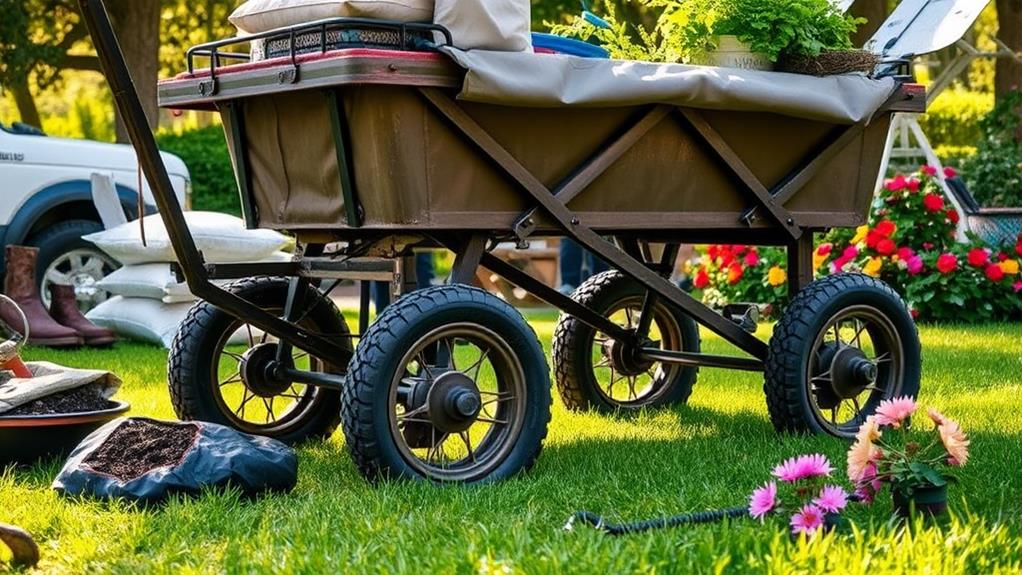
Comprehending the specifications and features of heavy-duty garden wagons is just the beginning; proper maintenance secures their longevity and peak performance. Regular cleaning and wheel maintenance are crucial to keep your wagon in top shape.
Here's a quick reference table to help you with maintenance routines:
| Task | Frequency | Cleaning Techniques |
|---|---|---|
| General Cleaning | After each use | Rinse with water, mild soap |
| Wheel Inspection | Monthly | Check for cracks, wear |
| Lubrication | Every 6 months | Use grease on moving parts |
For cleaning, avoid harsh chemicals; they can damage the materials. Use a soft brush or cloth to eliminate dirt and debris. Regarding wheel maintenance, keep an eye on the tires and bearings. Verify they're inflated correctly and free from obstructions. If you notice any issues, address them immediately to prevent further damage.
User Testimonials
User experiences provide invaluable insights into the performance and reliability of heavy-duty garden wagons. When you're investing in a garden wagon, hearing from those who've used them can guide your decision-making process. Many users report high satisfaction ratings, emphasizing the durability and versatility of these wagons.
Here are three common user experiences that stand out:
- Load Capacity: Users frequently mention how much they appreciate the heavy load capacities, allowing them to transport large amounts of soil, plants, or tools without compromising stability.
- Ease of Use: Many testimonials highlight the ease of maneuverability, even in tight spaces. This is especially essential for those working in gardens who need to navigate around flower beds and narrow paths.
- Weather Resistance: Satisfaction ratings often include comments on the wagons' ability to withstand various weather conditions, ensuring they remain functional over time.
Buying Guide
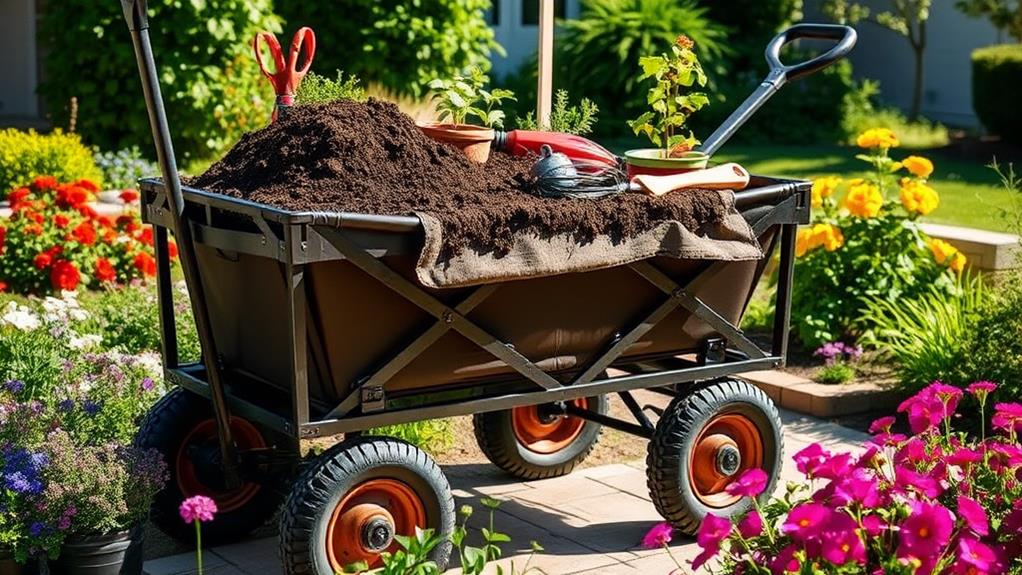
When selecting a heavy-duty garden wagon, it is vital to contemplate several key factors that impact its performance and suitability for your needs. First, consider the load capacity. A wagon with a higher load capacity can handle heavier materials, which is fundamental for serious landscaping tasks. Confirm it aligns with the weight of the items you typically transport.
Next, evaluate the wheel types. Different wheel designs—such as pneumatic, solid rubber, or plastic—offer varying levels of maneuverability and durability. Pneumatic wheels provide better shock absorption and are ideal for rough terrains, whereas solid rubber wheels are puncture-proof and require less maintenance.
The wagon's construction material also matters. Metal frames tend to be more durable but heavier, while plastic options are lightweight and resistant to rust. In addition, check if the wagon has features like removable sides, foldable designs, or adjustable handles, which can improve versatility.
Ultimately, selecting the right heavy-duty garden wagon hinges on comprehending your specific needs and preferences. By carefully considering these factors, you can find a wagon that empowers you to tackle any landscaping project with ease and efficiency. Look for features such as sturdy construction, high weight capacity, and smooth maneuverability to ensure optimal performance. A massive garden hauling wagon with durable wheels and a spacious bed can make transporting soil, plants, and tools significantly easier. Investing in the right wagon will not only save you time and effort but also enhance your overall gardening experience.
Frequently Asked Questions
What Materials Are Commonly Used in Heavy-Duty Garden Wagons?
When you think about heavy-duty garden wagons, don't you want something that stands the test of time? Most of these wagons feature robust steel frames, providing unmatched strength and durability for hauling hefty loads. To combat the elements, manufacturers often prioritize rust resistance, ensuring your investment remains functional for years to come. Furthermore, many models incorporate weather-resistant fabrics or plastics, enhancing their longevity and making them perfect for all your landscaping needs.
Are Heavy-Duty Garden Wagons Suitable for All Terrains?
Yes, heavy-duty garden wagons are typically suitable for various terrains, thanks to their terrain adaptability. The wheel design plays a vital role in this capability, as larger, rugged wheels can navigate gravel, mud, and uneven ground more effectively. When selecting a wagon, consider the type of terrain you'll encounter most often and make sure it features wheels that provide stability and traction. This will improve your outdoor experience and allow for greater freedom in your gardening tasks.
How Much Weight Can a Typical Heavy-Duty Garden Wagon Carry?
You might be wondering how much weight a heavy-duty garden wagon can handle. The answer varies, but most can support a weight capacity of 1,000 pounds or more, depending on the model. Proper load distribution is essential; overloading one side could lead to tipping or damage. So, if you're hauling bulky materials or tools, make certain you balance the load to maintain stability and prevent accidents during your outdoor freedom.
Can I Use a Garden Wagon for Purposes Other Than Landscaping?
Absolutely, you can use a garden wagon for purposes beyond landscaping. Their versatility allows for alternative uses like transporting sports gear, hauling camping supplies, or even moving groceries. Many models are designed to handle various terrains, making them suitable for outdoor adventures or trips to the park. With their sturdy construction, you can rely on them for tasks around the home or garden, providing you with the freedom to plunge into diverse activities effortlessly.
Where Can I Find Replacement Parts for My Garden Wagon?
To find replacement parts for your garden wagon, start by checking manufacturer websites and authorized dealers for specific components. Online marketplaces like Amazon and eBay often have a wide selection as well. Local hardware stores might additionally stock common parts. For effective wagon maintenance, regularly inspect wheels and frames, and lubricate moving parts to extend lifespan. Keeping your wagon in top shape guarantees you'll get the most out of it for various uses.
